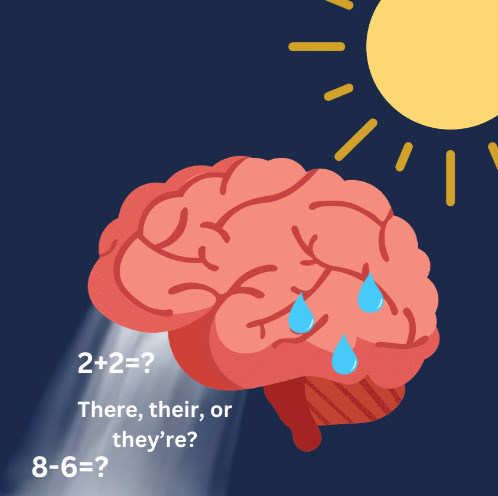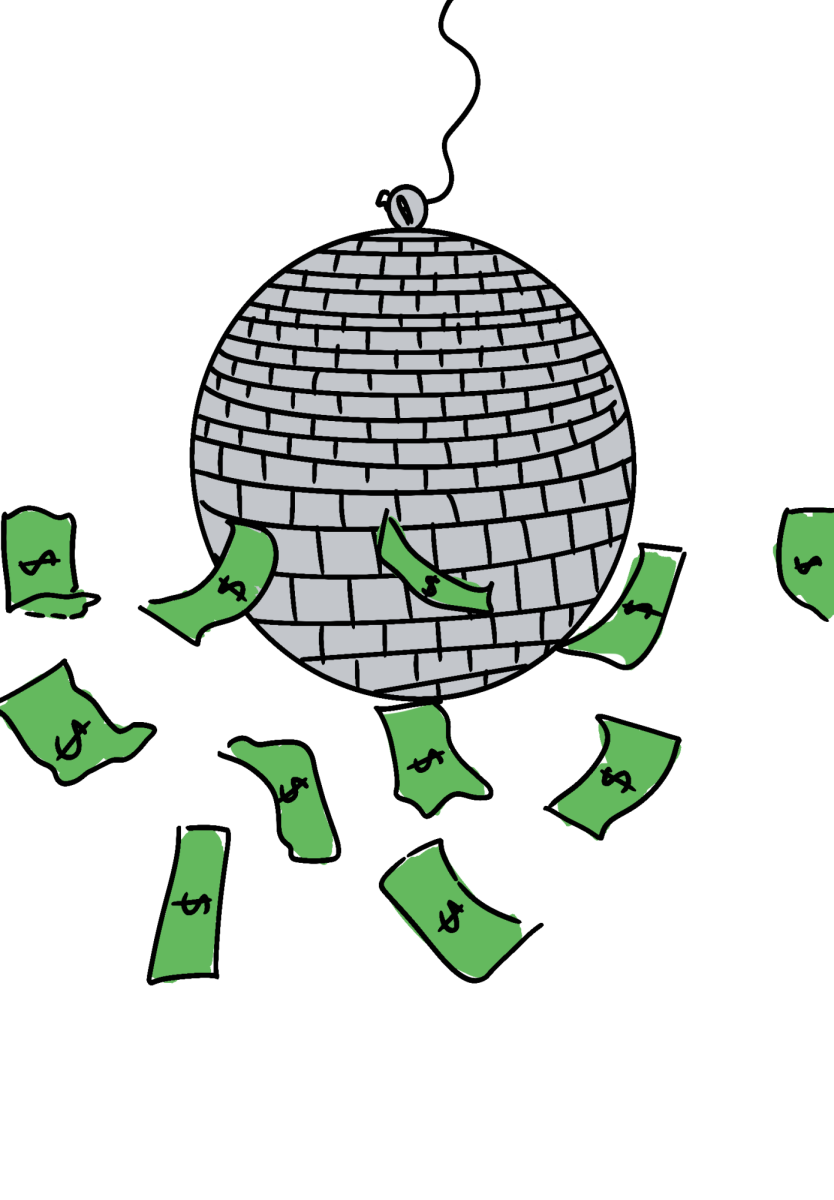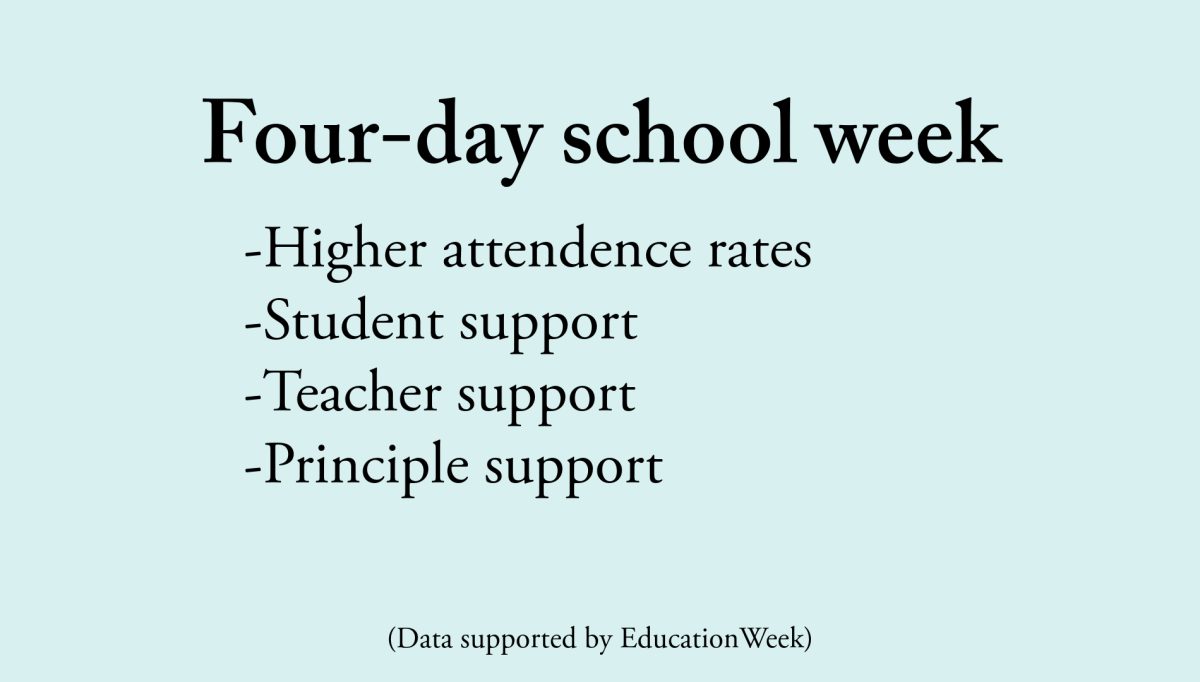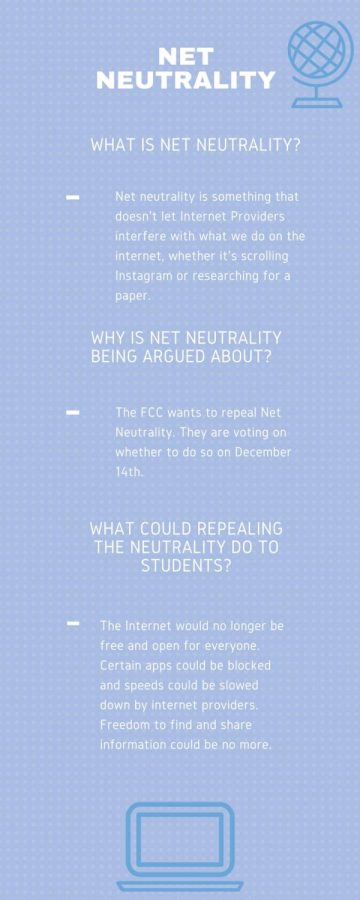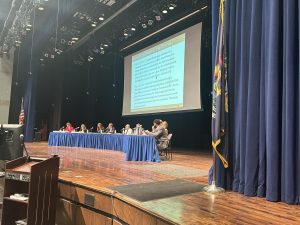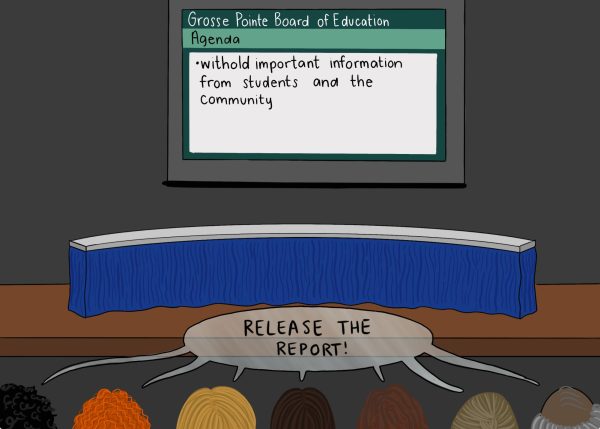Different perspectives about net neutrality before the FCC vote tomorrow
The FCC is going to vote on whether to repeal net neutrality Dec. 14. Graphic courtesy of Henry Ayrault ’19.
December 13, 2017
Advantages of net neutrality- by Aidan Walsh ’20
Federal Communications Commission (FCC) will vote on whether or not to repeal net neutrality laws established in 2015 this Thursday, Dec. 14. his set of laws essentially sets restrictions on internet service providers, preventing them from blocking, limiting, or charging for any data or information found on the worldwide web. These rules maintain balance and equality on the internet– and now they are at risk.
Current FCC chairman Ajit Pai, appointed by President Trump in 2017, claims that repealing the laws in question would stop disincentivizing for ISPs (Internet Service Providers), and I must agree with his intentions, as investment in the industry is down over seven billion dollars in the last two years. However, this end most certainly does not justify the means.
The main problem with getting rid of net neutrality is that repealing the laws would let ISPs branch and build their networks, but let them operate virtually unrestricted in determining what content is allowed to which user. The basic principles of equality for all internet users would be compromised in what is essentially a major disregard of morality and ethics in favor for improved profit.
Many take the stance that, although repealing net neutrality would allow these companies to do such things, this doesn’t automatically mean that they would. To them, I would remind them that the lack of evidence is not evidence in itself, and in actuality it would be likely that these companies would indeed take some of these measures. In fact we’ve seen one do it before. Some might recall that in early 2014 (before current net neutrality laws were in place), internet provider Comcast slowed the connection of the streaming platform Netflix to a crawl until they paid a fee to allow regular connection speeds to resume.
Under current regulations, such an exploitation would never be allowed to occur. The ability of internet providers to slow or speed up connections is a blatant abuse of a company that provides what is now an essential service in today’s world. Even if someone would come out and deem the actions of a company unfair and morally irresponsible, nothing could be done to change it, as so few companies are in a position to provide wide-spread internet services. In other words, internet service providers could do whatever they wanted in the public eye because they control an essential resource that few could do without. And where would an unsatisfied consumer turn to ? Another big-name service provider, in the exact same position, with the exact same authority over what can and can’t be accessed for whatever price on the internet. There is no risk here for these companies; only profit.
Letting companies like Comcast, Verizon, and AT&T provide internet without restriction may/will have severe ramifications for consumers. Undoubtedly, the average customer can start to expect offers from their internet provider which charge them for extra packages to allow them access to certain mediums, like streaming or gaming. The internet will effectively cost more and provide less. Imagine what most people take for granted today– services as simple as Google or Youtube could be paid services and could be given slowed or faster connections at the whim of the internet provider.
Many are taking a stance against the net neutrality repeal. Battle For The Net, a movement started with the intention of maintaining net neutrality, has had over 750,000 people write to Congress against the repeal according to political website The Hill. Internet forerunners and high profile technologists have also participated in a petition to the FCC protesting the repeal vote. Famous names included are Sir Tim Berners-Lee, creator of the World Wide Web, Vint Cerf, another founding father of the internet, and co-founder of Apple Steve Wozniak.
The preservation of net neutrality is critical to the future of the internet. Beyond economical advances, maintaining equality on the web is an issue of civil rights, and guarantees basic freedoms every American should be allowed.
Disadvantages of net neutrality– by Dominic Dulac ’20
This Thursday, Dec. 14, The FCC (Federal Communications Commision) is holding a vote on whether or not to get rid of ‘net neutrality’ laws. These laws currently regulate internet providers and their ability to manipulate the services they distribute. Supporters of net neutrality believe that it protects online consumers and better ensures the preservation of the internet. However, this may not be entirely true.
Net neutrality rules were first established in the U.S. in 2015, but for the decades it existed before that, the internet was fine. And with their potential destruction looming before us only two years later, it amazes me that people are suddenly convinced that the world as we know it is going to crumble because these guidelines are not explicitly stated or enforced.
I support equality on the internet. However, I also believe in the concept of self-regulation. And despite the fact that few people seem to believe this, those two things can go hand-in-hand. The unproven rumor going around that says if net neutrality is revoked, then internet service providers such as Comcast or AT&T will favor certain websites over others and ultimately cause the destruction of the online free market is just that: unproven.
While current laws prohibit these businesses from tampering with the internet speeds and content certain websites have, there is nothing that proves that their extinguishment will result in companies doing so. It is true that without the regulations, service providers would be able to charge certain websites money so they can access faster internet speeds. It is also true that this could favor large online corporations such as Amazon and Netflix who can foot the bill while smaller websites suffer because users don’t want to have to deal with slow internet. On top of all of that, it is true that the service providers could even charge their customers more to view certain websites.
However, in the event that the requirements are repealed, it is unlikely that any of those circumstances will ever come to pass. The reasons are simple: not only is it potentially morally irresponsible (and bad PR) in the way that these actions would be seen as discriminatory, it is simply fiscally irresponsible.
It is absolutely irrational to believe that internet providers would start favoring websites or charging users for using certain sites. Maybe it initially seems like another way for the companies to generate revenue; however, it would most likely result in the death of the company. Take this hypothetical scenario where a greedy service provider decides to charge for certain websites. The chain of events would be as follows: first, profits would maintain and maybe even increase due to the new way they get income. However, soon enough customers would become infuriated at the limitations, and so they would simply drop the provider and switch to a competitor who doesn’t charge extra for those websites. Eventually, the company would be bled dry because consumers would rather use those providers who allow full and untainted access to the internet.
Seeing as how no company would ever want to be put in the situation above, no one will ever risk it. Thus, even without specific laws that ensure all consumers can access the internet in its general entirety, the internet service providers would self-regulate and maintain the principles of net neutrality because they create a profitable environment. And so the only thing that these laws do for the world is provide a preexistent sense of security and equality for internet users, while limiting positive innovations that service providers could make. That is why the revocation of net neutrality laws has more potential to do more good than bad.












